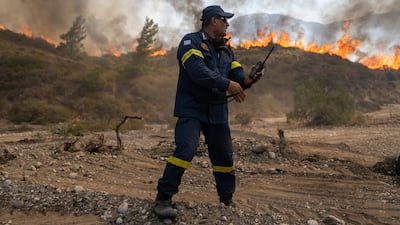The manager of our hotel was almost in tears. “Those poor people on Rhodes. The holidaymakers will be OK, they can go home. But the people who live there are left with nothing, I don’t know what they can do.”
We’re in Greece, on the western mainland. While we’ve not suffered any wildfires of our own, it’s impossible not to be affected by what has been unfolding elsewhere, in Rhodes, Corfu and Evia. There is a pall of gloom over the locals.
While no one, mercifully, has been injured or killed, what worries them is the future, the thought that the fires will affect the entire tourist industry upon which so much of Greece depends. It accounts for 18 per cent of the country’s GDP and one in five jobs – more in the islands where reliance on tourists is even greater.
Coverage of apocalyptic scenes, of families rushing to escape, boarding boats and fleeing down roads, bedding down in emergency shelters, they fear can only dissuade others from coming.
They’d like to inject a little perspective. Greece is hot this year, struck by a heatwave. In truth, though, it’s hot every year and there have been higher temperatures. Where we are, it’s been 36ºC every day, but in the past, in Kos and Rhodes, and in neighbouring Turkey, we’ve experienced 42ºC to 44ºC.
There have always been forest fires in Greece. Greek history is littered with devastating infernos, with heavy loss of life. They’re normal for this part of the world, for the entire southern Mediterranean.
It’s Greece’s misfortune that the worst struck place is Rhodes, a visitor magnet and one that lends itself to dramatic pictures. It could just as easily have been Turkey – or another nation could, too, have been a location that was not a holiday centre, was empty of hotels and of no interest to the media.
The area affected in Rhodes amounts to 10 per cent of the island, most of it in the middle where few tourists venture. Likewise, the total evacuated so far is 19,000 – of whom fewer than 10,000 are foreigners – versus 200,000 visitors in Rhodes. For this latter overwhelming majority, their holiday continues as normal.
Wildfires, the Greeks insist, break out all the time in summer in this region and most are dealt with quickly and efficiently. What was unlucky was that these fires had been whipped up by wind and took hold before the full firefighting effort could be deployed.
They’re not climate change deniers in Greece. Equally, though, they point out that the hotter world does not cause fires to start – in contrast to some of the reporting.
Humans spark the flames, either deliberately and unforgivably (in Corfu, they’re investigating if arson was behind four outbreaks in different spots beginning simultaneously) or accidentally, usually by a discarded cigarette end or a piece of dropped glass or a picnic barbecue not put out properly.
It’s not climate change that dries the trees and scrub. They’re dry anyway.
What does have an impact, what accelerates the spread of the fire, is the wind. And that is down to the planet heating.
Daily, the mornings are calm, then mid to late afternoon, what was a breeze frequently intensifies, the result of the heat building. In some parts of Greece, in the Aegean in particular, that can act like a funnel. What is good for the sailors and windsurfers, and for the sunbathers who welcome the fresh air, is not so beneficial if you’re trying to halt a forest fire.
The Greeks wear a mixture of dismay and resignation, but also determination. There are steps that could be taken to reduce the likelihood of a few flickering flames soon spiralling out of control.
Vegetation hastens or slows the spread. Pine and densely packed piles of bone-dry broken branches are the worst. The resin in pine behaves like an oil when lit.
Olive bushes, planted apart, are not so flammable. Therein lies a problem, since climate change is damaging the olive oil crop – and wine, too (fires among vineyards are also easier to deal with than impenetrable pine forest and scrub). So, the imperative to grow olives is not so strong.
More reconnaissance and firefighting equipment is required. More detailed contingency planning, too. That is often not easy where islands lack resources but jealously guard their own government.
While other countries have rushed to assist Greece, there is also only so much they can do – and despite their best efforts, getting firefighters and equipment to the fire takes precious time.
Greece, they’re very much aware, has to help itself. That means as well building more substantial firebreaks. It means barring people from wandering into forests at certain periods of the year, fencing those forests and making it an offence to enter. It means issuing more warnings, more instructions on precautions to take.
It means too, throwing the book at anyone found to have intentionally started a wildfire.
Contrary to popular opinion, the arsonist may not be the crazy fire-starter of popular legend but can be a calculating developer, seeking to clear woodland for building. Unfortunately, the fire turns out to be bigger and wilder than they envisaged.
In Turkey, when fires caused colossal damage to holiday areas in 2021, the edict went out from Ankara to neuter the reporting, to not be too negative. That has not occurred in open Greece. If anything it has gone the other way.
The sun lounger and pool beckon, perhaps a dip in the sea, in crystal clear blue water, followed by a leisurely lunch of Greek salad and fresh fish, and gorgeous, just-picked fruit.
Let it be said loud and clear, lest it be forgotten: Greece is also paradise, like nowhere else.























